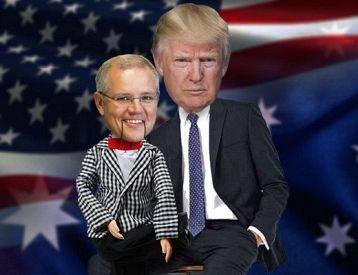by Bevan Ramsden
The president of the United States in his First Inaugural Address in March 4, 1801 said:
“…peace, commerce, and honest friendship with all nations, entangling alliances with none”.

Unfortunately, his country did not heed his words. Australia also has not heeded those words and is entangled in an alliance with a country that ex PM Malcolm Fraser said is a dangerous ally. He also said, in his book, “Dangerous Allies” that Australia had become a subservient partner in that alliance believing it desperately needs the military protection of this big power ally and is prepared to follow that ally into overseas illegal and morally unjustifiable wars to maintain that protection. An alternative independent defence policy for Australia would refute that position. And in establishing an independent foreign policy and an independent self- defence force, the alliance with the United States would need to be managed and adjustments made. That includes Australia acting independently in pursuit of the best interests of its people where that becomes necessary.
In the words of Ex-PM Malcolm Fraser in his book “Dangerous Allies”: “Strategic Independence does not mean ending our relationship with America and cutting our ties. It does mean having a different relationship, a more equal one in which we can feel free to say no or offer a differing opinion…. Strategic independence would allow Australia to agree or disagree with both Washington and Beijing as it suits our interests. We should not be afraid to express our views and stick to our beliefs.”
Canada, for example, has done this in the past without jeopardising its close relationship with the U.S.. Canada did not commit troops to the war in Vietnam or Iraq as these did not involve its strategic interests. NZ is still in ANZUS but does not allow U.S. warships or those of any country into its ports unless they declare they are not carrying nuclear weapons. As U.S. warships will not give that declaration they are blocked from entering NZ ports.
There are at least two occasions in the past where Australia has done this. Emma Shortis in her book “An exceptional friend” states that Australia took the opposite position to the United States in the past by supporting the UN Treaty banning mining in the Antarctic and also in opposing the Apartheid regime in South Africa. So these precedents show that Australia can take an independent position within the alliance without ending that alliance.
Management of the alliance therefore includes taking decisions in the best interests of the Australian people to safeguard sovereignty and promote peace and keep out of unnecessary wars.
Defining Australia’s essential strategic interests is a starting point. For example, in the current situation which Australia faces, the advice of ex PM Paul Keating should be considered: “Taiwan is not a vital Australian interest, let me repeat that, Taiwan is not a vital Australian interest. We have no alliance with Taipei, none. There is no document you can find. We do not recognise it as a sovereign state right.”
Asserting our interests would involve advising the US and UK that Australia does not see Taiwan as an essential strategic interest and will not be militarily involved in defence of Taiwan against structural change in the relationship between the Chinese Government and Taiwan whether or not it involves militarily or non-militarily coercion by the Chinese government.
The next step to take in adjusting Australia’s relationship within the alliance is to advise the US that Australia is taking steps to re-structure its ADF to concentrate on territorial sovereign defence. That re-structure includes provisioning for this role and includes re-assessment of the best submarine acquisition for local coastal territorial defence.
Asserting a restructuring of the ADF for defence of Australia’s sovereign territory is in line with what the USA has frequently asked of its allies under various presidents including Obama and Trump. They wanted their allies to take more of the burden, more of the financial load off the US, in defending their territories albeit remaining within the alliances with the USA, of course. So a move for Australia to take responsibility for its territorial defence should not only be understood but welcomed by the USA. Deciding against nuclear-propelled submarines which are designed for long-distance operations and for diesel-electric versions more suitable for coastal shallow water defence, might however, draw the ire of certain military-industrial corporations.
Surveys show that Australian people strongly support the signing of the UN Treaty to Prohibit Nuclear Weapons (TPNW) believing that Australia will be safer for doing so. In implementing the democratic will of the Australian people and acting independently in Australia’s interests, the Australian government would therefore need to advise the U.S. that the Australian Government will sign the TPNW and then determine what adjustments have to be made to ratify and comply with the Treaty
Subsequently, the Australian government will have to advise that in ratifying and complying with the TPNW, it is giving the requisite one year’s notice to the U.S. that:
* the Relay Ground Station at Pine Gap which directly supports US nuclear war plans and potential operations, needs to be closed down
* the North West Cape (Harold Holt) Communications will be closed to the US for communicating with its nuclear submarines
* Australian ports are not open to warships that do not declare they are not carrying nuclear weapons; neither are Australia’s airports and runways available to aircraft which do not declare they are not carrying nuclear weapons, which is the position NZ takes in relation to warships
And further Australia wishes to remove itself from the protection of the so-called “US nuclear umbrella”.
These are all decisions that can be taken by an Australian government implementing an independent foreign policy for the betterment of the Australian people without withdrawing from the alliance with the United States but managing better Australia’s relationship within it.
Unfortunately, the current position is that both major political parties show no inclination to adopt anything less than a subservient position in the U.S. alliance showing groveling acquiescence to its foreign policy and its increasing use of Australia as its south pacific military base. The desire for an independent foreign policy and keeping Australia out of U.S. wars is espoused by a small, but increasing section of the Australian community. Until that political ambition is strong enough and vocal enough to move political parties, we are unlikely to see an Australian government assert itself and make these independent decisions for the betterment of the Australian people.




